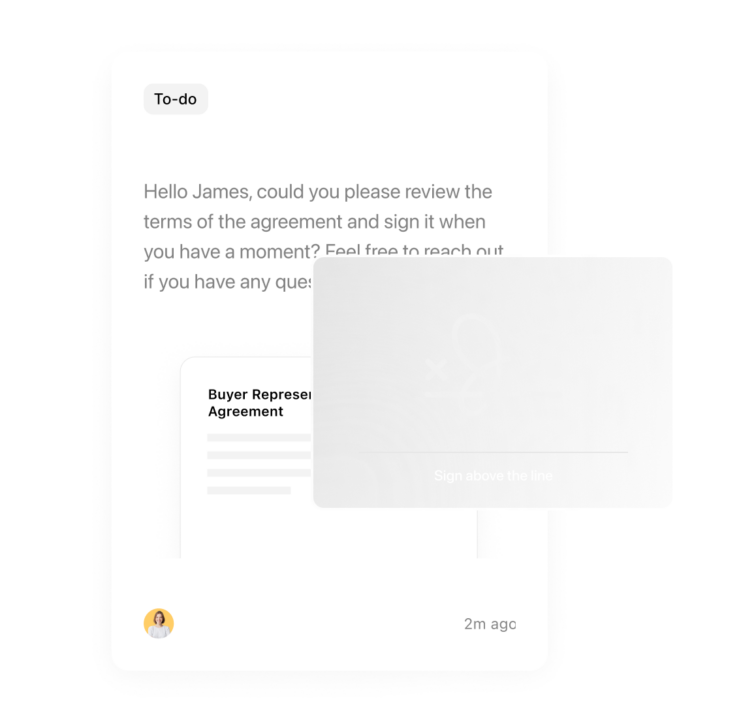For real estate agents considering career advancement, understanding the role of a real estate broker is crucial. Brokers have the licensing, skills, and experience to operate independently, manage transactions, and even oversee other licensed real estate professionals.
By knowing the distinctions between agents, brokers, and Realtors, real estate professionals can better understand their own career paths and the additional opportunities that come with becoming a broker. This article outlines what is a real estate broker, how they differ from agents, and what steps you need to take to reach this level in your real estate career.
Find It Fast
What is a real estate broker?
It’s easy for clients — and even professionals — to confuse the roles of agents, brokers, and Realtors. Here’s how each one fits into the real estate landscape:
- Real estate agent: A licensed professional who helps clients buy, sell, or rent properties. Agents must work under a licensed broker and cannot operate their own brokerage.
- Real estate broker: Brokers have more advanced training and a separate license that allows them to work independently, manage a team of agents, and oversee transactions. They also have the option to open their own brokerage.
- Realtor: A real estate professional (agent or broker) who is a member of the National Association of Realtors (NAR) and follows the association’s strict code of ethics. Not all agents or brokers are Realtors, and other professionals — such as appraisers or trainers — can also be NAR members.
These distinctions not only help agents understand career possibilities but also enable them to guide clients in choosing the right real estate professional for their needs.
Types of real estate brokers
Within the broker designation, there are three main roles. Understanding each one can help agents decide how they want to progress and what kind of broker role might fit them best.
- Associate broker: Similar to an agent, an associate broker works under another broker’s supervision, but typically brings more experience, training, and knowledge to the table.
- Managing broker: This type of broker supervises agents within a brokerage, handling training, compliance, and day-to-day operations.
- Principal broker: The top broker who has ultimate responsibility for all agents and legal aspects of the business at a particular brokerage, this role is typically suited for professionals who have significant industry experience and want full authority over the firm’s strategic direction.
Keep in mind that several states, including North Carolina and Illinois, refer to real estate agents as brokers and have additional titles for professionals with more advanced licenses.
For agents aspiring to management roles, these options highlight various pathways to advance their careers while contributing in different capacities.
The responsibilities of a real estate broker
Brokers have more authority than agents, which can be a compelling reason for agents to consider making the transition. Key duties include:
- Supervising agents: Brokers often act as mentors, coaches, and leaders.
- Handling complex negotiations: Brokers are skilled negotiators and may assist with challenging transactions, benefiting both clients and their agents.
- Overseeing business operations: Many brokers manage finances, marketing, and other areas essential for the brokerage’s success. They may also be in charge of recruiting and training new agents.
- Ensuring compliance: Brokers are ultimately responsible for making sure all transactions meet legal and ethical standards.
Buyer’s agent comp strategies
Get three buy-side compensation structures that will appeal to clients while protecting your paycheck. We also include templates with sample language you can use to amend your current buyer’s agreement.

How to become a real estate broker
Advancing to a broker level requires a commitment to education, experience, and licensing. Agents interested in this path can follow these steps:
- Start as a licensed agent: You’ll need to earn your real estate license, which includes pre-licensing coursework and passing an exam.
- Gain experience in the field: Many states require two to three years of experience as an agent before pursuing a broker license.
- Complete broker-specific education: Broker licensing requires advanced coursework on topics such as business law, property management, and ethics.
- Pass the broker licensing exam: This test covers more advanced material than the agent exam, including legal and operational topics.
- Apply for a broker license: Once licensed, you’ll be able to work independently, manage agents, or even open your own brokerage.
Real estate broker vs. agent: Which role fits your goals?
For agents, deciding whether to become a broker often depends on long-term goals. Here’s a look at situations where pursuing a broker license might be advantageous:
- Increasing earning potential: Brokers generally earn more than agents, as they can take on additional responsibilities, negotiate their own commissions, and split commissions with agents they supervise.
- Managing a team: While you can manage a team as an agent, a broker license creates an even higher level of leadership potential, allowing those who enjoy training and overseeing other associates to manage an entire brokerage.
- Specializing in complex transactions: Brokers bring enhanced knowledge, which can help in transactions that involve legal intricacies or high prices, making this license ideal for agents seeking specialized skills.
The earning potential: Broker vs. agent
Brokers typically earn more than agents due to the additional roles and responsibilities they can take on. Here’s a breakdown of how agents and brokers earn their livings:
- Agents generally earn through commissions, which vary widely but often range from $50,000 to $90,000 annually, depending on the market, experience, and sales volume.
- Because they can manage agents, brokers often have multiple income streams, including agent commission splits and brokerage profits. In competitive markets, experienced brokers can earn six figures, especially if they own or lead a successful brokerage.
Questions to consider before becoming a broker
Reflecting on goals can help agents determine if becoming a broker aligns with their skills and career aspirations. If you’re thinking about becoming a broker, here are a few key thoughts to consider:
- Do you enjoy mentorship and leadership? Brokers need strong people skills, as they’re often training and supervising agents.
- Are you prepared for more complex transactions? As a broker, you’ll handle more legal and financial responsibilities.
- Is ownership or management part of your career plan? Many brokers eventually open their own brokerages or move into executive roles within established ones.
The evolving role of brokers in today’s real estate market

The broker’s role has transformed in today’s digital, fast-paced market. Many brokerages now employ advanced tools, such as customer relationship management systems and digital marketing platforms, to enhance efficiency and reach. Brokers are often at the forefront of adopting new technology, helping their agents stay competitive.
For agents considering a broker’s license, this expanded toolkit provides opportunities to improve client services, manage larger teams, and enhance overall productivity in ways that wouldn’t have been possible even a few years ago.
Weighing the benefits of becoming a broker
For real estate agents, understanding the broker role provides insight into new ways to grow within the field. While it requires dedication and a commitment to continuing education, becoming a broker opens doors to higher earnings, increased authority, and broader career possibilities. By considering the responsibilities, income potential, and leadership opportunities that come with a broker license, agents can make an informed decision about the best path forward in real estate.
How Luxury Presence can help
The journey to building a strong, independent brand isn’t easy, but powerful digital tools can help. Luxury Presence offers agents who are thinking about becoming brokers beautifully designed, custom websites and advanced marketing solutions to help attract high-end clients and establish authority in the market. Start building your online presence with Luxury Presence today and take the next step toward a thriving real estate career.
Luxury Presence can elevate your marketing strategy
Learn how we can help take your real estate business to the next level. Schedule a time to speak with one of our branding experts today.





